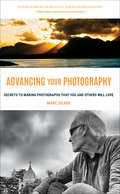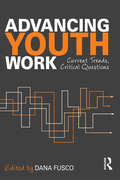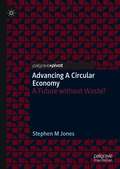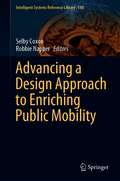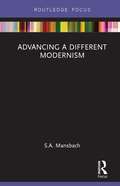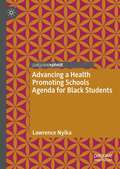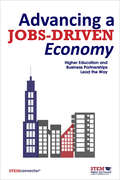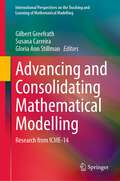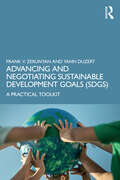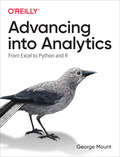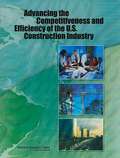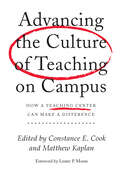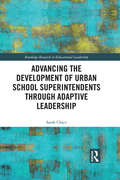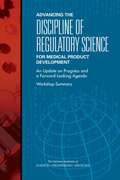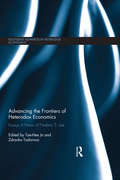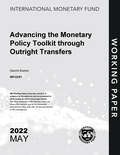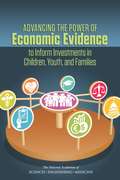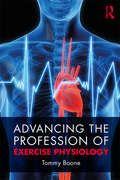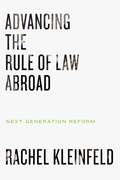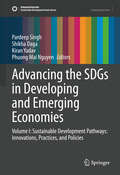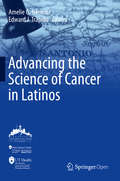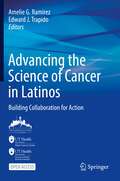- Table View
- List View
Advancing Your Photography: Secrets to Making Photographs that You and Others Will Love
by Marc SilberThe author of Create presents &“an all-in-one, easily accessible handbook . . . [that] will show you how the pros do it. Study this and take your best shot&” (Chase Jarvis, award-winning photographer). In Advancing Your Photography, Marc Silber provides the definitive handbook that will take you through the entire process of becoming an accomplished photographer. From teaching you the basics to exploring the stages of the full &“cycle of photography,&” Silber makes it easy for you to master the art form and create stunning pictures. From thousands of hours of interviews with professional photography masters, you will learn valuable insights and tips on beginner, amateur, landscape, wedding, lifestyle, sports, animal, portrait, still life, and iPhone photography. Advancing Your Photography features: · Top tips for making outstanding photographs from iconic photographers and many other leading professional photography masters of today · Numerous step-by-step examples · Guidance on training your eye to see composition with emotional impact · Tips on mastering the key points of operating your camera like a pro · Secrets to processing your images to professional standards Photography and the technology associated with it are constantly evolving, but the fundamentals remain the same. Advancing Your Photography will help to bring you the joy and satisfaction of a lifetime of pursuing the art of photography.
Advancing Youth Work: Current Trends, Critical Questions
by Dana FuscoThis path-breaking book brings together an international list of contributors to collectively articulate a vision for the field of youth work, sharing what they have learned from decades of experience in the training and education of youth workers. Carefully designed evaluation and research studies have legitimized the learning potential of youth programs and non-school organizations over the last twenty years, and recent attention has shifted towards the education, training, and on-going professional development of youth workers. Contributors define youth work across domains of practice and address the disciplines of knowledge upon which sound practice is based, reviewing examples of youth practitioner development both in and outside of academia. Raising critical questions and concerns about current trends, Advancing Youth Work aims to bring clarity to the field and future of youth work. Advancing Youth Work will help youth work practitioners develop a common language, articulate their field in one voice, and create a shared understanding of similarities and differences. This book is also an invaluable resource for higher educators, researchers, and students involved with youth work.
Advancing a Circular Economy: A Future without Waste?
by Stephen M JonesThis book explores an escalating modern-day crisis; managing waste in a sustainable way. The central question posed is whether advancing a circular economy provides a way to shift waste management practices towards more sustainable approaches. It begins with an in-depth analysis of the nature of waste management and the prevailing crisis, followed by a discussion about the circular economy in terms of its requirements and the challenges of implementation. The book then moves on to propose a framework that sets out how to establish the policy changes needed to advance a circular approach to waste management. Next, the book outlines complex issues in multilevel systems for advancing a circular economy through examining the contemporary situation in Belgium and Norway. It ends by bringing together the issues revealed in these case studies and draws insights for governments advocating circular approaches. The book will be a valuable resource to scholars, students, practitioners and policy makers interested in developing more sustainable methods of waste management.
Advancing a Design Approach to Enriching Public Mobility (Intelligent Systems Reference Library #198)
by Selby Coxon Robbie NapperThis book examines research at the intersection of design and public mobility from both an academic and practice perspective. An eclectic collection of projects and topics not normally found in the mainstream literature on transportation, from implementing gender-sensitive design to examining how to reconceptualize future public interactions with mobility. The book brings together leading thinkers in design and mobility from around the world and from different modal perspectives sharing insights into how we navigate the emerging public mobility landscape. This collection is valuable for transport operators and practitioners seeking to better understand the impact design can have on public mobility and innovate in a rapidly changing operational environment.
Advancing a Different Modernism (Routledge Focus on Art History and Visual Studies)
by S.A. MansbachAdvancing a Different Modernism analyzes a long-ignored but formative aspect of modern architecture and art. By examining selective buildings by the Catalan architect Lluís Domènech i Montaner (1850-1923) and by the Slovenian designer Jože Plecnik (1872-1957), the book reveals the fundamental political and ideological conservatism that helped shape modernism’s history and purpose. This study thus revises the dominant view of modernism as a union of progressive forms and progressive politics. Instead, this innovative volume promotes a nuanced and critical consideration of how architecture was creatively employed to advance radically new forms and methods, while simultaneously consolidating an essentially conservative nationalist self-image.
Advancing a Health Promoting Schools Agenda for Black Students
by Lawrence NyikaThis book centralizes the importance of using culturally relevant models within health promoting schools (HPS) to promote the participation of Black students. In current HPS models Black students are often overlooked. The author presses beyond the mainstream, science-focused research on HPS to grapple with issues of power, prejudice, and oppression and focus on the social determinants of health. By focusing on social constructs as a constraint to Black students’ wellbeing (rather than only disease), chapters present a multidimensional whole-school intervention aimed at comprehensively bridging the empowerment gap between Black students and historically privileged students.
Advancing a Jobs-Driven Economy: Higher Education and Business Partnerships Lead the Way
by STEMconnector®Aligning corporate, education, and community partners requires that we rethink and redesign the system that supports Science, Technology, Engineering and Mathematics (STEM) education and workforce preparedness. What’s at stake? Nothing less than the sustainability of our schools, the innovative engines of our businesses, the prosperity of communities, and the global competitiveness of our economies. Advancing A Jobs Driven Economy is a call to action and provides the framework for how business, education, and communities can cultivate a sustainable pipeline of STEM talent.
Advancing and Consolidating Mathematical Modelling: Research from ICME-14 (International Perspectives on the Teaching and Learning of Mathematical Modelling)
by Gilbert Greefrath Gloria Ann Stillman Susana CarreiraThis edited volume presents applications and modelling as a world-renowned sub-field of research in mathematics education. It includes the discussion on students’ development of modelling competency through the teaching of applications and modelling. The teaching of mathematical modelling is considered from different perspectives, such as mathematical, pedagogical-didactical perspectives and critical-societal or socio-political perspectives. Assessment practices (local, regional or international) of modelling activities and difficulties with modelling activities at school and university levels, respectively, are discussed. Use of technology and other resources in modelling activities and their impact on the modelling processes are included in the considerations. Teaching practices, teacher education and professional development programs concerning the integration of applications and modelling in school and university mathematics programs are developed in this context.
Advancing and Negotiating Sustainable Development Goals (SDGs): A Practical Toolkit
by Frank V. Zerunyan Yann DuzertAdvancing and Negotiating Sustainable Development Goals (SDGs) presents a negotiation framework based on the principles of network/collaborative governance in implementing UN Sustainable Development Goals (SDGs). Trialed in the classroom and workplace, the practical toolkit gives you the tools necessary for facilitating future collaboration and knowledge transfer to all those working to strengthen the formulation, implementation, and achievement of SDG-oriented policies. Advancing and Negotiating Sustainable Development Goals (SDGs) is essential reading for those interested in a better and more sustainable future for all.
Advancing into Analytics: From Excel To Python And R
by George MountData analytics may seem daunting, but if you're an experienced Excel user, you have a unique head start. With this hands-on guide, intermediate Excel users will gain a solid understanding of analytics and the data stack. By the time you complete this book, you'll be able to conduct exploratory data analysis and hypothesis testing using a programming language.Exploring and testing relationships are core to analytics. By using the tools and frameworks in this book, you'll be well positioned to continue learning more advanced data analysis techniques. Author George Mount, founder and CEO of Stringfest Analytics, demonstrates key statistical concepts with spreadsheets, then pivots your existing knowledge about data manipulation into R and Python programming.This practical book guides you through:Foundations of analytics in Excel: Use Excel to test relationships between variables and build compelling demonstrations of important concepts in statistics and analyticsFrom Excel to R: Cleanly transfer what you've learned about working with data from Excel to RFrom Excel to Python: Learn how to pivot your Excel data chops into Python and conduct a complete data analysis
Advancing the Competitiveness and Efficiency of the U.S. Construction Industry
by National Research Council of the National AcademiesConstruction productivity--how well, how quickly, and at what cost buildings and infrastructure can be constructed--directly affects prices for homes and consumer goods and the robustness of the national economy. Industry analysts differ on whether construction industry productivity is improving or declining. Still, advances in available and emerging technologies offer significant opportunities to improve construction efficiency substantially in the 21st century and to help meet other national challenges, such as environmental sustainability. Advancing the Competitiveness and Efficiency of the U.S. Construction Industry identifies five interrelated activities that could significantly improve the quality, timeliness, cost-effectiveness, and sustainability of construction projects. These activities include widespread deployment and use of interoperable technology applications; improved job-site efficiency through more effective interfacing of people, processes, materials, equipment, and information; greater use of prefabrication, preassembly, modularization, and off-site fabrication techniques and processes; innovative, widespread use of demonstration installations; and effective performance measurement to drive efficiency and support innovation. The book recommends that the National Institute of Standards and Technology work with industry leaders to develop a collaborative strategy to fully implement and deploy the five activities
Advancing the Culture of Teaching on Campus: How a Teaching Center Can Make a Difference
by Matthew Kaplan Constance E. CookWritten by the director and staff of the first, and one of the largest, teaching centers in American higher education – the University of Michigan’s Center for Research on Learning and Teaching (CRLT) – this book offers a unique perspective on the strategies for making a teaching center integral to an institution’s educational mission. It presents a comprehensive vision for running a wide range of related programs, and provides faculty developers elsewhere with ideas and material to prompt reflection on the management and practices of their centers – whatever their size – and on how best to create a culture of teaching on their campuses. Given that only about a fifth of all U.S. postsecondary institutions have a teaching center, this book also offers a wealth of ideas and models for those administrators who are considering the development of new centers on their campuses.Topics covered include:• The role of the director, budgetary strategies, and operational principles• Strategies for using evaluation to enhance and grow a teaching center• Relationships with center constituencies: faculty, provost, deans, and department chairs• Engagement with curricular reform and assessment• Strengthening diversity through faculty development• Engaging faculty in effective use of instructional technology• Using student feedback for instructional improvement• Using action research to improve teaching and learning• Incorporating role play and theatre in faculty development• Developing graduate students as consultants• Preparing future faculty for teaching• The challenges of faculty development at a research universityIn the concluding chapter, to provide additional context about the issues that teaching centers face today, twenty experienced center directors who operate in similar environments share their main challenges, and the strategies they have developed to overcome them through innovative programming and careful management of their resources. Their contributions fall into four broad categories: institutional-level challenges, engaging faculty and students and supporting engaged pedagogy, discipline-specific programming, and programming to address specific instructor career stages.
Advancing the Development of Urban School Superintendents through Adaptive Leadership (Routledge Research in Educational Leadership)
by Sarah ChaceBased on a case study of urban school superintendents in a leadership development program, this book offers a concrete demonstration of how adaptive leadership is applied and learned. Blending the theory of adaptive leadership with the practice of urban school superintendents, this book also utilizes the analytic lens of transformative learning as developed by Jack Mezirow.
Advancing the Discipline of Regulatory Science for Medical Product Development: Workshop Summary
by Engineering Medicine National Academies of SciencesThe field of endeavors known as “regulatory science” has grown out of the need to link and integrate knowledge within and among basic science research, clinical research, clinical medicine, and other specific scientific disciplines whose focus, aggregation, and ultimate implementation could inform biomedical product development and regulatory decision making. Substantial efforts have been devoted to defining regulatory science and communicating its value and role across the scientific and regulatory ecosystems. Investments are also being made in technology infrastructure, regulatory systems, and workforce development to support and advance this burgeoning discipline. In October 2015, the National Academies of Sciences, Engineering, and Medicine held a public workshop to facilitate dialogue among stakeholders about the current state and scope of regulatory science, opportunities to address barriers to the discipline’s success, and avenues for fostering collaboration across sectors. Participants explored key needs for strengthening the discipline of regulatory science, including considering what are the core components of regulatory science infrastructure to foster innovation in medical product development. This report summarizes the presentations and discussions from the workshop.
Advancing the Framework for Assessing Causality of Health and Welfare Effects to Inform National Ambient Air Quality Standard Reviews
by Division on Engineering and Physical Sciences Division on Earth and Life Studies Board on Environmental Studies and Toxicology National Academies of Sciences, Engineering, and Medicine Board on Mathematical Sciences and Analytics Committee on Assessing Causality from a Multidisciplinary Evidence Base for National Ambient Air Quality StandardsAs part of its responsibilities under the Clean Air Act, the U.S. Environmental Protection Agency sets National Ambient Air Quality Standards (NAAQS) for the air pollutants carbon monoxide, lead, oxides of nitrogen, particulate matter, ozone, and sulfur dioxide. EPA uses a "weight of evidence approach" to evaluate evidence from scientific studies and describe the causal relationships between these "criteria pollutants" and any adverse impacts on human health and on public welfare - including impacts on wildlife, water, forests, agriculture, and climate. The evaluation, called an Integrated Science Assessment, is used to inform standards setting associated with the criteria pollutants. This report, produced at the request of EPA, describes EPAs and several other frameworks for inferring causality of health or welfare effects and the characteristics of evidence useful for forming a causal determination. The report concludes that EPAs causal framework is effective, reliable, and scientifically defensible, provided that key scientific questions are identified and a range of necessary expertise is engaged. More transparency in how EPA integrates evidence could improve confidence in their determinations, and more guidance is needed in the framework on how evidence should be examined for vulnerable groups (e.g., human sub-populations) and sensitive ecosystems or species.
Advancing the Frontiers of Heterodox Economics: Essays in Honor of Frederic S. Lee (Routledge Advances in Heterodox Economics)
by Tae-Hee Jo Zdravka TodorovaThis collection of essays honors the life and work of one of the most prominent and fervent heterodox economists, Frederic S. Lee, who has been at the heart of the heterodox economics movements for the past three decades. Authors in this book demonstrate that heterodox economic has transcended the criticism of mainstream economics and, more importantly, that constructive developments are in the making by way of cross-communications among various heterodox economics traditions. Frederic S. Lee’s contributions to heterodox economics are centered on three themes: the making of a history and identity of heterodox economics, heterodox microeconomics, and the heterodox analysis of social provisioning. Part I addresses the importance of history, theory, research methods, and institutions in the making of the identity of heterodox economics as an alternative to mainstream economics. Part II delves into heterodox microeconomic theories—in particular, investment, pricing, competition, markets, and market governance—as foundations of heterodox macroeconomic analyses. Part III expands the analysis of the capitalist social provisioning process with an emphasis on its subsystems and their relationships over historical time. Part IV encapsulates the life and work of Frederic S. Lee. Throughout his intellectual life Frederic S. Lee has shown to many that the development of heterodox economics is rendered possible by unselfish and ceaseless efforts to build both theory and institutions. Essays in this book attest that establishing an alternative critical theory to the status quo is not only possible but also serviceable to the majority of the population.
Advancing the Monetary Policy Toolkit through Outright Transfers (Imf Working Papers)
by BuetzerA report from the International Monetary Fund.
Advancing the Myth: Sustaining an Iconic Brand Over Time
by Douglas B. HoltEven the most successful iconic brands routinely stumble when it comes to managing a brand myth so that it remains vital for many years. To extend a powerful myth, the brand's communications must steer a path between two traps: milking the myth to capitalize on its popularity, and abandoning the myth entirely to pursue the next big trend.
Advancing the Power of Economic Evidence to Inform Investments in Children, Youth, and Families
by Engineering Medicine National Academies of SciencesIn recent years, the U.S. federal government has invested approximately $463 billion annually in interventions that affect the overall health and well-being of children and youth, while state and local budgets have devoted almost double that amount. The potential returns on these investments may not only be substantial but also have long-lasting effects for individuals and succeeding generations of their families. Ideally, those tasked with making these investments would have available to them the evidence needed to determine the cost of all required resources to fully implement and sustain each intervention, the expected returns of the investment, to what extent these returns can be measured in monetary or nonmonetary terms, and who will receive the returns and when. As a result of a number of challenges, however, such evidence may not be effectively produced or applied. Low-quality evidence and/or a failure to consider the context in which the evidence will be used may weaken society’s ability to invest wisely, and also reduce future demand for this and other types of evidence. Advancing the Power of Economic Evidence to Inform Investments in Children, Youth, and Families highlights the potential for economic evidence to inform investment decisions for interventions that support the overall health and well-being of children, youth, and families. This report describes challenges to the optimal use of economic evidence, and offers recommendations to stakeholders to promote a lasting improvement in its quality, utility, and use.
Advancing the Profession of Exercise Physiology
by Tommy BooneIn recent times, the ASEP (American Society of Exercise Physiologists) leaders have developed and implemented academic standards to promote professionalism in academic programs throughout the U.S. The effort represents a significant change in the scope and the monitoring of the exercise physiologists' accountability. Through these new standards, all academic exercise physiologists are challenged by ASEP to accept responsibility for promoting the professionalization and self-regulation that will lead to lead to improved client and patient care when prescribing exercise medicine. Accreditation helps to reduce unnecessary variation within and between academic programs. Moreover, given the collaborative improvement in academic programs and faculty responsibility to the undergraduate students, the quality of their educational care will be significantly improved. Academic exercise physiologists must take responsibility for where exercise physiology is today and take responsibility to the evolving state of exercise physiology and student market-driven career opportunities in exercise medicine. Advancing the Profession of Exercise Physiology provides understanding and guidance on the importance and the significance of academic leadership in promoting the profession of exercise physiology as a healthcare profession that is founded on professionalism, accreditation, ethical practice, and entrepreneurial skills. This new volume examines the ethical need for professionalism in exercise physiology, which is, in turn, imperative for future growth and sustainability.
Advancing the Regional Commons in the New East Asia (Politics in Asia)
by Siriporn Wajjwalku Kong Chong Ho Osamu YoshidaAdvancing the Regional Commons in the New East Asia highlights a number of interests which members of ASEAN and Plus Three countries collectively recognize. This set of common interests includes not only economic development but also social development. Written by nationals in their respective countries, the different chapters in this volume highlights the different foundations for such common interests and these reflect the different constructive ways in which ASEAN and Plus Three countries come to see a multi-strand cooperative partnership. The task of advancing the regional commons will involve efforts to recognise and nurture ASEAN’s and Plus Three’s common interests in terms of broad social development, managing regional security issues, the development of a regional infrastructure, and ensuring collective progress for all member countries. ASEAN becomes a community in 2015 and the idea of embracing, protecting, sustaining and advancing the regional commons become a vital process. Concurrently, APT has also realized that its contribution to the achieving goal of community and promoting regional commons is absolutely critical for both ASEAN and the Plus Three countries. Academics will find in this volume a clear analytical treatment of issues which regional groupings are currently facing and this can provide the basis for a comparative analysis. This volume will also be of interest to students and the general public looking for a systematic introduction to the successful implementation of cooperative ventures and also an assessment of the new collaborative energies which shape this dynamic region.
Advancing the Rule of Law Abroad
by Rachel KleinfeldIn the modern era, political leaders and scholars have declared the rule of law to be essential to democracy, a necessity for economic growth, and a crucial tool in the fight for security at home and stability abroad. The United States has spent billions attempting to catalyze rule-of-law improvements within other countries. Yet despite the importance of the goal to core foreign policy needs, and the hard work of hundreds of practitioners on the ground, the track record of successful rule-of-law promotion has been paltry.In Advancing the Rule of Law Abroad, Rachel Kleinfeld describes the history and current state of reform efforts and the growing movement of second-generation reformers who view the rule of law not as a collection of institutions and laws that can be built by outsiders, but as a relationship between the state and society that must be shaped by those inside the country for lasting change. Based on research in countries from Indonesia to Albania, Kleinfeld makes a compelling case for new methods of reform that can have greater chances of success.This book offers a comprehensive overview of this growing area of policy action where diplomacy and aid meet the domestic policies of other states. Its insights into the practical methods and moral complexities of supporting reform within other countries will be useful to practitioners and students alike.
Advancing the SDGs in Developing and Emerging Economies: Volume I: Sustainable Development Pathways: Innovations, Practices, and Policies (Sustainable Development Goals Series)
by Pardeep Singh Shikha Daga Kiran Yadav Phuong Mai NguyenThis contributed volume, the first in a set of two, explores the intersection of innovation and sustainability, investigating how transformative practices across various industries and regions are advancing the Sustainable Development Goals (SDGs). It highlights a wide network of solutions and real-world examples that integrate various SDG principles into business and government strategies. The chapters cover diverse topics, including green finance, human resource management, sustainable marketing, and the adoption of cutting-edge technologies, showcasing how innovation is driving the global transition towards a more sustainable future. The geographic diversity represented in this section—including contributions from Italy, Brazil, Vietnam, India, and Malaysia—provides a rich, multi-regional perspective on sustainable development. The chapters reflect the dynamic ways in which innovation is being harnessed to address pressing global challenges, with a focus on both local and global contexts. Each chapter offers in-depth case studies and practical examples, illustrating how SDG principles are being integrated into various sectors to foster long-term sustainability. Together, these contributions emphasize the critical role of innovative strategies and practices in achieving the SDGs and building a more resilient, sustainable world for future generations.
Advancing the Science of Cancer in Latinos
by Amelie G. Ramirez Edward J. TrapidoThis open access book gives an overview of the sessions, panel discussions, and outcomes of the Advancing the Science of Cancer in Latinos conference, held in February 2018 in San Antonio, Texas, USA, and hosted by the Mays Cancer Center and the Institute for Health Promotion Research at UT Health San Antonio. Latinos – the largest, youngest, and fastest-growing minority group in the United States – are expected to face a 142% rise in cancer cases in coming years. Although there has been substantial advancement in cancer prevention, screening, diagnosis, and treatment over the past few decades, addressing Latino cancer health disparities has not nearly kept pace with progress. The diverse and dynamic group of speakers and panelists brought together at the Advancing the Science of Cancer in Latinos conference provided in-depth insights as well as progress and actionable goals for Latino-focused basic science research, clinical best practices, community interventions, and what can be done by way of prevention, screening, diagnosis, and treatment of cancer in Latinos. These insights have been translated into the chapters included in this compendium; the chapters summarize the presentations and include current knowledge in the specific topic areas, identified gaps, and top priority areas for future cancer research in Latinos. Topics included among the chapters: Colorectal cancer disparities in Latinos: Genes vs. EnvironmentBreast cancer risk and mortality in women of Latin American originDifferential cancer risk in Latinos: The role of dietOvercoming barriers for Latinos on cancer clinical trialsEs tiempo: Engaging Latinas in cervical cancer researchEmerging policies in U.S. health care Advancing the Science of Cancer in Latinos proves to be an indispensable resource offering key insights into actionable targets for basic science research, suggestions for clinical best practices and community interventions, and novel strategies and advocacy opportunities to reduce health disparities in Latino communities. It will find an engaged audience among researchers, academics, physicians and other healthcare professionals, patient advocates, students, and others with an interest in the broad field of Latino cancer.
Advancing the Science of Cancer in Latinos: Building Collaboration for Action
by Amelie G. Ramirez Edward J. TrapidoThis open access book is a collection of articles based on presentations from the 2020 Advancing the Science of Cancer in Latinos conference that gives an overview of conference outcomes. The vision of the conference has been to unite researchers, scientists, physicians and other healthcare professionals, patient advocates, and students from across the world to discuss research advancements, identify gaps, and develop actionable goals to translate basic research findings into clinical best practices, effective community interventions, and professional training programs to decrease cancer risks and eliminate cancer disparities for Latinos. This conference comes at an especially important time when Latinos – the largest and youngest minority group in the U.S. – are expected to face a 142% rise in cancer cases in the coming years. Disparities continue to impact this population in critical areas: access to preventive and clinical care, changeable risk behaviors, quality of life, and mortality. Each chapter summarizes the presentation and includes current knowledge in the specific topic areas, identified gaps, and opportunities for future research. Topics explored include: Applying an Exposome-Wide (ExWAS) Approach to Latino Cancer DisparitiesSupportive Care Needs and Coping Strategies Used by Latino Men Cancer SurvivorsOptimizing Engagement of the Latino Community in Cancer ResearchLatino Population Growth and the Changing Demography of CancerImplementation Science to Enhance the Value of Cancer Research in Latinos A Strength-Based Approach to Cancer Prevention in LatinxsOvercoming Clinical Research Disparities by Advancing Inclusive Research Advancing the Science of Cancer in Latinos: Building Collaboration for Action will appeal to a wide readership due to its comprehensive coverage of topics ranging from basic science and community prevention research to clinical practice to policy. The book is an essential resource for physicians and other medical professionals, researchers, scientists, academicians, patient advocates, and students. It also will appeal to policy-makers, NCI-designated cancer centers, academic centers, state health departments, and community organizations.
